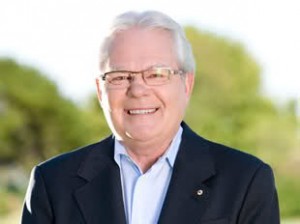When it comes to the journalism world of Australian football, or ‘soccer’ as it’s known to many, nobody is bigger than Les Murray.
The Sydney-based 66-year-old has made his mark on football in Australia in a huge way, earning the nickname ‘Mr Football’ in the process.

Host of Australia’s leading soccer program The World Game, which incidentally is a phrase coined by him, Murray has been at the head of the growth of the game since he first joined the SBS network when it began in the 1980s.
Murray sounded very calm and relaxed throughout our interview, showing his wisdom as he recounts his memories and experiences from over his many years in the game.
Murray first came to Australia in 1957, emigrating with his family from Hungary when he was 11-years-old. As a huge lover of football, Murray was surprised to see the game’s little presence in this country.
‘It was a massive shock,’ Murray says.
‘I didn’t realise that there was a country in the world where football was not the national obsession.’
His love of football grew into a passion for increasing awareness of the game in Australia when he took his first job as a newspaper journalist in 1972.
From there he did a brief stint as a football commentator for Channel Ten in the late 1970s; however, his career didn’t take off until he joined the SBS network in 1980.
His first job at SBS was as a caption editor for Hungarian programs and his transition to the SBS sports team came purely by accident.
While he was still in his first job for SBS, he was approached by the man who hired him as a football commentator for Channel Ten and asked if he could commentate on a televised game on SBS.
‘He spotted me in a corridor and said I’m really glad to see you Les because we’ve got a soccer match coming up that we’re going to broadcast and I need you to commentate,’ Murray recalls.
This was the moment that sparked Murray’s career as one of the country’s greatest football commentator and journalist. During this period, the late Johnny Warren was signed as Murray’s co-commentator and the pair soon became icons of the game in Australia.
‘We were seen as the champions of the world game in this country,’ Murray says.
In spite of all of this, becoming a journalist was not always Murray’s plan.
In his youth, Murray wanted to be a professional footballer. However, a lack of focus on his football career caused him to abandon his original plan and instead he turned to sports journalism, his second love.
‘We sports commentators are all frustrated players … [because] we’d rather be out on the field playing for Real Madrid … than writing about them.’
Through the growth of his journalism career, Murray cites his key influences as Gyorgy Szepesi, a Hungarian sports commentator and journalist, and Eric Batty, writer for the British based World Soccer magazine.
‘While I was in Hungary there was a legendary radio commentator there … [and] he was the best I’ve ever heard, even to this day,’ Murray says.
‘He was the sort of guy who would describe football matches and you’re almost there, you saw the pictures through his words.’
Murray’s other major influence, Batty, was a premier sports journalist who worked on the British magazine World Soccer, which reported on football in most international leagues.
Murray eventually became friends with Batty when he was living in England in the 1970s. The pair then travelled across Europe to watch live football matches because they would not be televised outside the country they were being played in.
He eventually returned to Australia with the goal of enhancing this country’s football profile by amplifying its coverage. His contribution shows through the growth that we see today.
With the introduction of the A-League in 2004, short term success in signing big names seemed like a far cry. However, with the recent signing of footballing greats such as Alessandro Del Piero and Emile Heskey to A-League teams, Murray believes that football in Australia is ‘definitely moving in the right direction.’
A huge part of Murray’s influence has been on the broadcast of the FIFA World Cup. Since its acquisition in 1990, SBS has increased its audience of the World Cup every year to the point where it has become a staple in Australian sporting culture.
‘With every World Cup we broadcast, it’s always record audiences, so it’s enjoying a huge status within Australian society today … [and] everybody knows what the World Cup is.’
Perhaps Murray’s biggest achievement, or rather achievements, have come in the form of the honours he’s received for his work on furthering the game in the country. And in doing so, furthering the country’s sporting culture.
In 2006 Murray was inducted into the Football Federation of Australia’s Hall of Fame, for his work on increasing the profile of football in the country.
He was also made a member of The Order of Australia, for his service in the promotion and development of football in Australia.
These are both massive honours that many Australians hope to achieve and to Murray, they have a very strong personal meaning with Australia being his adopted home country.
‘It means an awful lot to me, because I’m an immigrant. So I’m extremely proud of my country.
‘You come here as an immigrant from a foreign land far, far away without even speaking the language, and the country embraces you.’
Murray has become a figure of success in Australian sport throughout his years in the industry and he shows no sign of stopping as the game of football in Australia continues to grow.
As long as there is football being played, Les Murray is here to stay.
Mohammad Safar is a first-year student currently studying a Bachelor of Journalism (Sport) at La Trobe University. You can follow him on Twitter: @MoSafar23





